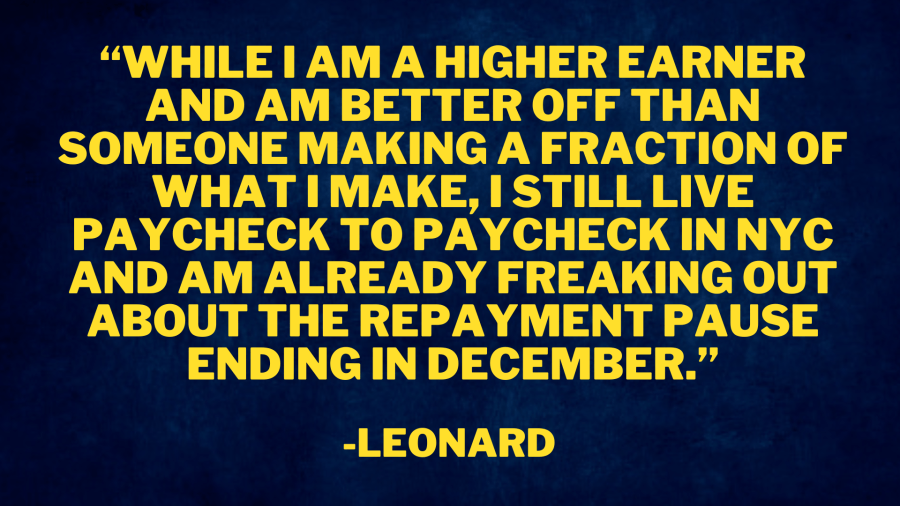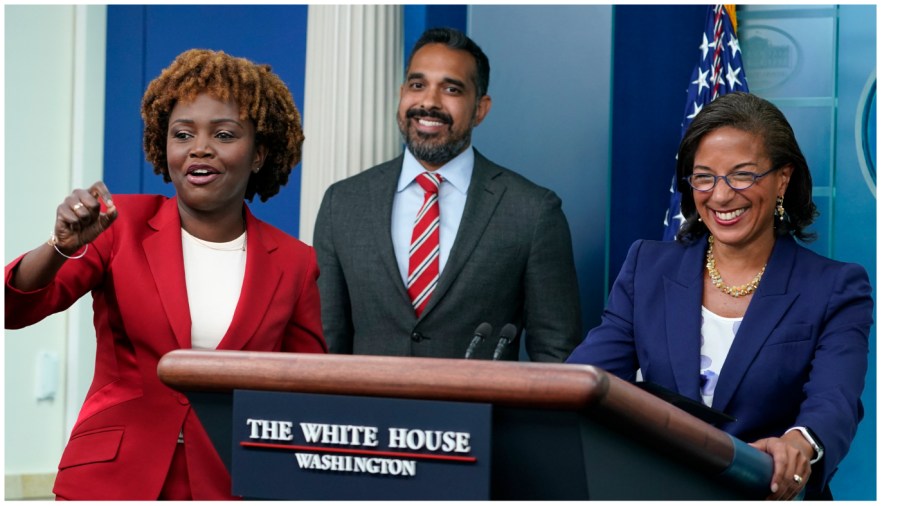Biden student loan plan leaves Black borrowers wanting more
In 2016, South Side Chicago native James Alford proudly became the first in his family to graduate from college.
But that sense of pride was marred by student loans. When Alford graduated with his Bachelor of Arts in political science with a minor in Black studies, he was around $50,000 in debt.
Now, at 30, with his Master of Science in adult and higher education, that number is closer to $120,000.
Alford is one of millions of Black Americans who have been disproportionately impacted by the student loan crisis.
Black student loan borrowers hold the most debt out of any other racial group. An April report by PBS NewsHour found that, among 2016 graduates, nearly 40 percent of Black students graduated college with $30,000 or more in debt compared to only 29 percent of white students, 23 percent of Hispanic students and 18 percent of Asian students.
President Biden on Wednesday announced a plan to cancel up to $10,000 in student loans for Americans making less than $125,000 annually. But Alford, like many other Black Americans, had mixed emotions.
“It’s cool, but it really doesn’t mean anything,” said Alford. “I feel like there were promises for more, and I feel like more could be done to ease the burden on people of color and first generation students.”
Some progressives praised Biden’s announcement; others, like those in the Congressional Black Caucus ,(CBC) called for more focus on the impact the crisis has had on Black borrowers.
“The burden of student loan debt has disproportionately impacted Black borrowers for far too long, leaving many stuck with thousands of dollars of debt, hindering their abilities to plan for the future and build intergenerational wealth,” said CBC Chairwoman Joyce Beatty (D-Ohio) in a statement Wednesday.
She applauded the president’s decision, saying it will “provide much-needed relief to Black borrowers,” but added that the caucus would continue to “push additional reforms to ensure current and future borrowers are not subjected to this cycle of burdensome debt.”
Beatty’s is a sentiment shared by the NAACP.
“Many people were wiped out of homeownership because their credit-debt ratio was too high to qualify for homeownership or for quality housing.”
–Derrick Johnson, president of the NAACP
For months, the NAACP has called on the Biden administration to cancel a “bare minimum” of $50,000 in student loan debt.
“If student debt repayments can be paused over and over and over again, there’s no reason why the President cannot cancel a minimum of $50,000,” the NAACP said in a critical statement Tuesday.
But Biden’s move to forgive up to $20,000 for Pell Grant recipients — 46 percent of whom are Black — saw Derrick Johnson, president of the NAACP, walk back some of the organization’s criticism.
“That goes to the president’s commitment to address the racial wealth gap,” Johnson told The Hill.
The Student Borrower Protection Center (SBPC) has also indicated the debt has exacerbated racial financial inequities.
“The first thing you have to understand is the fact that student debt is not only a direct reflection of systemic disparities we have in this country, but it also continues to perpetuate them,” said Kat Welbeck, director of advocacy and the civil rights counsel at the SBPC.
Welbeck said Biden’s decision was a positive and historic action, but added there is more to do to fix the “broken student loan system.”
To do that, she argued, there must be an acknowledgement of the cyclical nature the crisis has on Black families.
“When it’s time for [Black] families to send their children to school, they have less wealth to be able to pay for college,” said Welbeck. “So Black borrowers are not only more likely to borrow but also borrow higher amounts. When Black students leave school, they then also have these higher student debt balances that cuts into opportunities for wealth building over a lifetime.”
And the “No. 1 accelerator” for wealth building is homeownership, Johnson said.
“Many people were wiped out of homeownership because their credit-debt ratio was too high to qualify for homeownership or for quality housing,” explained Johnson. “In order for us to address this gap, we first have to deal with the student loan crisis, which is one of the number one held debts that many African Americans hold.”
Part of what’s kept Black families from building “intergenerational wealth” like homeownership, Welbeck added, has been the continued need for Black families to seek more and more student loans.
“Because of the way that the repayment system is set up, people are only making payments on the interest and not principal, so their balances balloon over time,” said Welbeck.
This then forces families into taking out parent PLUS loans for their children, adding to their own debt.
That’s why 19-year-old college sophomore Nia Cloyd hasn’t taken out any loans yet, despite her tuition payments piling up. Her fear over debt repayment has her wondering if college is even the right choice for her anymore.
“It’s just all about the money,” said Cloyd. “You have to worry about the back end of the money and your financial situation and can I even get a degree if I don’t pay my tuition?”
The concerns over debt repayment stopped Cloyd from going to her dream school. So when she heard about Biden’s loan forgiveness, she said it’s simply not enough for families like hers.
“The tuition that stopped me was $75,000 a year,” said Cloyd. Ten thousand dollars or even $20,000 is “still not enough equality” for Black families like hers, she added.
But the $50,000 forgiveness the NAACP has been pushing for would be, she said.

“That will cover room, board, books, transportation – all the little fees that they add on,” said Cloyd.
Cloyd said that putting off taking out loans is tied up in her desire to get ahead and build a better life. She’d always been told college would set her up for a successful, prosperous future. But after watching her mother struggle to pay her own student debt, Cloyd worries taking out loans would perpetuate a cycle of financial instability.
Welbeck said this is a common feeling, especially among Black families, because wealth and income are two different things.
“You can have a lot of Black borrowers who might have an income that may not make them eligible now for debt forgiveness but … they have a very high debt to income ratio,” Welbeck explained. “You don’t necessarily have a high income, because you might have a negative net worth because your debt is so high.”
That’s exactly what 28-year-old Leonard is struggling with.
Leonard, who asked for his last name to be withheld, went to college with the help of Pell Grants. But he now makes an annual salary of $140,000, disqualifying him from this round of loan forgiveness.
“While I am a higher earner and am better off than someone making a fraction of what I make, I still live paycheck to paycheck in NYC and am already freaking out about the repayment pause ending in December,” Leonard told The Hill in an email.
“I come from a low-income family and sometimes help family members financially,” he added. “There should be some kind of forgiveness for recipients who are ‘high earners’ but are economically disadvantaged compared to the large majority of high earners (i.e higher earning white people).”
Johnson said situations like Leonard’s have actually been discussed between the NAACP and the administration.
“We recognize that 90 percent of our borrowers will be able to qualify under the terms that the president announced,” said Johnson. “But with that there were individuals in the hole of the donut without high wealth … and we’ve got to continue to push the administration to figure out a way to address that population.”

For Johnson, voting in lawmakers who also want to eradicate student debt — including interest — will be the only way to accomplish the minimum $50,000 forgiveness.
Wednesday’s announcement, he said, is one more action in a long line of successes that should be on voters’ minds ahead of midterms and the 2024 presidential election.
The NAACP plans to keep pushing the Department of Education to make it easier for borrowers to qualify for relief programs and make sure those who are working in the public sector — like teachers, law enforcement and firemen — will have an easier time qualifying for the Public Service Loan Forgiveness program.
“Education is our future,” said Johnson. “We need to seek a different model so we’re not financing the future of this country on the backs of low income students. That isn’t fair.”
Copyright 2024 Nexstar Media Inc. All rights reserved. This material may not be published, broadcast, rewritten, or redistributed..

















